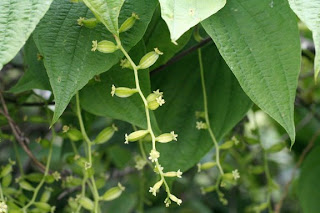WILD YAM

Latin Name: Dioscorea villosa
Alternate Names: Colic Root, Rheumatism Root, Chipahuacxituitl, Devil's Bones, Yuma, Rheumatism Root, Aluka (Sanskrit), Shan Yao (Chinese)
Family: DIOSCOREACEAE
Parts Used: Root, rhizome.
Properties: Anti-inflammatory, Antirheumatic, Antispasmodic, Aphrodisiac, Cholagogue, Diaphoretic, Diuretic, Expectorant, Nutritive.
Internal Uses: Colic, Diverticulitis, Dysmenorrhea, Flatulence, Infertility, Irritable Bowel, Labor Pain, Menopause, Muscle Cramps, Muscle Spasms, Neuralgia, Ovarian Pain, Rheumatism, Rheumatoid Arthritis, Threatened Miscarriage
Internal Applications: Tea, Tincture, Capsules.
It is a mild diaphoretic. Diosgenin is a precursor to progesterone and was once used to make birth control pills. It is also made into steroidal compounds. It helps to normalize hormones after an abortion. Wild Yam reduces inflammation and moves congested chi.
It is a mild diaphoretic. Diosgenin is a precursor to progesterone and was once used to make birth control pills. It is also made into steroidal compounds. It helps to normalize hormones after an abortion. Wild Yam reduces inflammation and moves congested chi.
Topical Uses: Eczema
Topical Applications: Salve for eczema. Recently, Wild Yam has been incorporated into a number of salves for women in an attempt to promote hormonal production.
Culinary uses: Dioscorea betada is a preferable Wild Yam to cook.
Energetics: Sweet, Bitter, Warm.
Chemical Constituents: Steroidal saponins (dioscin which becomes diosgenin), starch, alkaloid, tannins.
Contraindications: Avoid large doses during pregnancy unless so directed by a health professional.
Comments: The name Chipahuacxituitl is Aztec for Graceful Plant. This herb has been listed by United Plant Savers as an 'at risk' plant, so please avoid buying products harvested from the wild. Only use the cultivated herb.

Comments